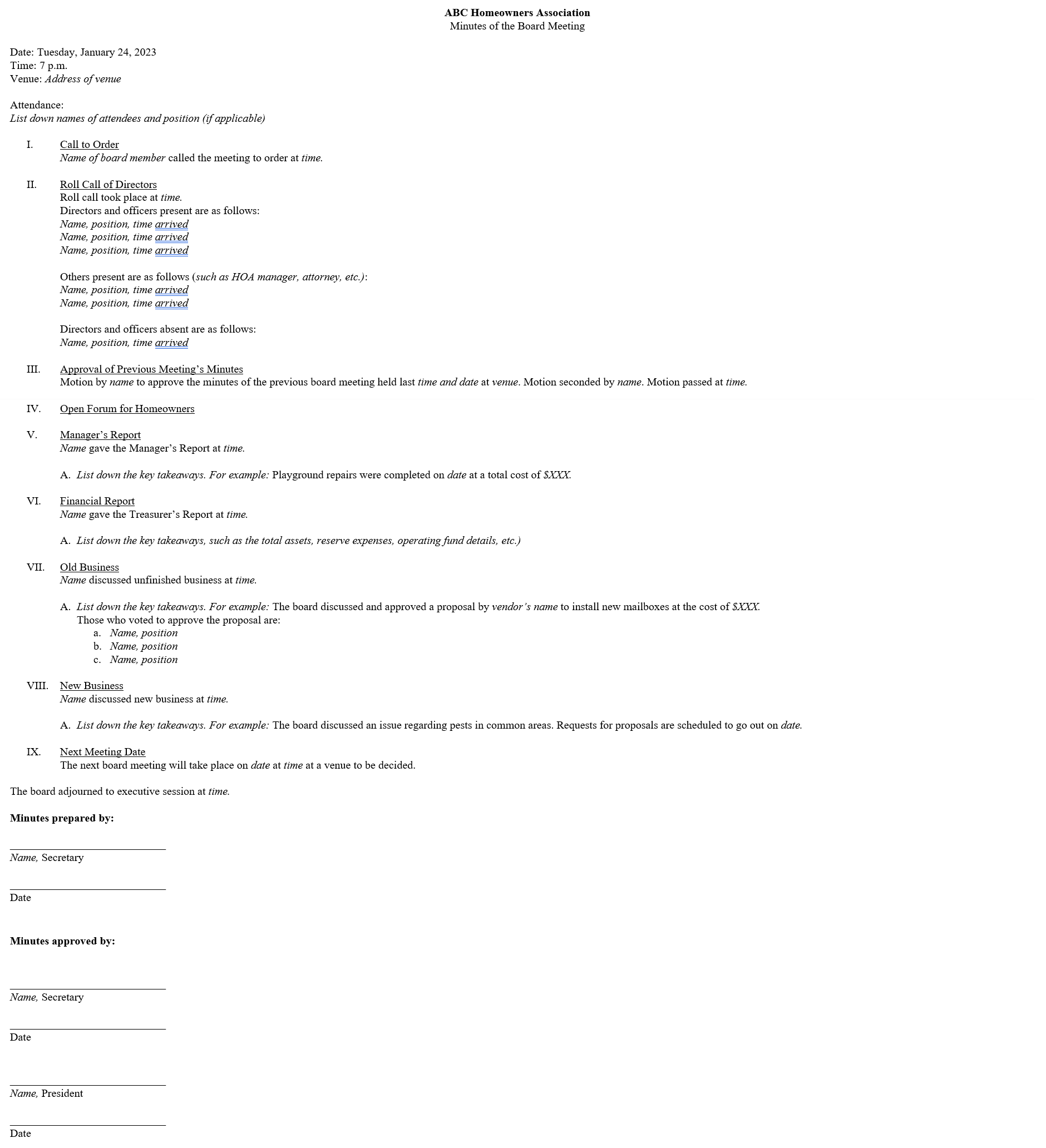The HOA board meeting minutes play an important role in the continuous operation of a community. Unfortunately, not all members know what these meeting minutes are and why they are essential. Additionally, there is some confusion about when these minutes must be distributed to homeowners. Clarifying these things will greatly supplement successful community management.
What Are HOA Board Meeting Minutes?
All homeowners associations hold board meetings. These meetings allow board members to discuss association business, make vital decisions, and generally keep the community running. At every meeting, though, there should be proper documentation. And this documentation comes in the form of meeting minutes.
What are the minutes of the meeting of the association?
Simply put, meeting minutes are written recordings of what occurred in HOA board meetings. They can also apply to annual membership meetings, special meetings, and other types of meetings. Meeting minutes are not scripts. They are concise summaries of the events of a meeting.
The Importance of HOA Meeting Minutes
Meeting minutes are essential to any organization, including homeowners associations, for many reasons. First of all, there are certain HOA board meeting minutes legal requirements that you must follow.
In most states, an HOA is legally required to take and maintain board meeting minutes. For instance, in Ohio, the Nonprofit Corporation Law applies to HOAs organized as nonprofits, most of which are. According to Section 1702.15 of that law, a corporation must keep minutes of all meetings, including board meetings, committee meetings, and membership meetings.
All official meetings that take place with a quorum must be documented. If a meeting fails to reach a quorum, it does not push through and, therefore, does not need minutes. Still, an HOA must note all missed, postponed, or canceled meetings in the minute book.
Even with no state requirement, associations should still take minutes at every official meeting for the following reasons:
- Meeting minutes serve as official and legal records that other parties may need access to. These parties include lawyers, mortgage companies, realtors, banking institutions, and homeowners.
- Meeting minutes promote accountability in members for their actions and decisions. Board members can use these minutes as a point of reference when attempting to recall their motions and responsibilities.
- Meeting minutes keep everyone up-to-date. If someone skips a meeting, they can simply check the minutes to understand what they missed.
What Should Be Included in Meeting Minutes?
If you are new to the HOA scene, there’s a good chance you don’t know the first thing about taking down meeting minutes. Check your governing documents, specifically your bylaws, as they might contain guidelines on the proper way for your HOA. You may also want to check past minutes to help you grasp the format.
How do you write minutes for an HOA meeting?
1. Basic Information
Start off with the fundamental details of the meeting. These include the name of your HOA and the meeting type. You should also include the date, time, and location of the meeting.
2. Attendance
Listing down the attendees lets you keep an accurate record of who was present at a particular meeting. Additionally, taking down attendance allows you to confirm whether or not you have achieved a quorum.
Your attendance should include the names of those present at the meeting, including board members, committee members, guest speakers, and homeowners. You may also want to note who came in late and failed to show up. If someone attends a meeting or casts a vote in place of another person, your minutes should also reflect that.
3. Timestamps
Your HOA board meeting minutes should also include important timestamps. Jot down what time the meeting started and when it ended. Furthermore, you should also note the time each item was discussed. These will allow you to see how long you spend on each item and evaluate how efficient your meetings are.
Don’t forget to write down the date and time of the next board meeting at the bottom of the minutes.
4. Report Summaries (President’s Report, Committee Reports, Financial Reports, etc.)
Many presentations take place during a board meeting. Various key people take turns providing reports that keep everyone up-to-date on community matters. Your meeting minutes should reflect a summary of these reports, who presented them, and the time they were presented.
Some of the reports you should expect to include are as follows:
 President’s Report
President’s Report- Officer Reports
- Manager Reports
- Committee Reports
- Financial Reports (total assets, reserve expenses, operating fund details, liens, bank account actions, etc.)
5. Discussions and Votes
Finally, your HOA board meeting minutes should depict all the discussions, motions, and votes that took place. These include the following details:
- Who made and seconded any motions
- Whether or not motions received approval
- Who voted for, against, or abstained from a particular issue
- Any old business and if it reached a resolution
- Any new business and when the board will address it
- Other actions that were taken (for example: the creation of a new committee and its members)
Who Takes HOA Board Meeting Minutes?
In most associations, taking down meeting minutes is part of the job of an HOA Secretary. However, some communities don’t have a secretary. In these cases, the board must appoint someone to take the minutes. Sometimes, the responsibility falls to the chair of the meeting. If the usual minutes-taker does not attend a meeting and someone else has to act as a substitute, the minutes should also reflect that.
Do HOA Board Meeting Minutes Need Approval?
The HOA board should approve all meeting minutes. This action typically takes place at the start of the board meeting, when the board approves the minutes of the previous meeting. Include the item in your meeting agenda to ensure you don’t forget this important step.
After approving the minutes, the secretary will make it official with their signature. Depending on the association, the president’s signature may also be necessary. Until the board approves and signs the meeting minutes, you can still make changes to them.
When Should HOA Meeting Minutes Be Distributed?
The HOA board should distribute the meeting minutes to all members within 30 days of the meeting. This is a general rule, though some state laws and your HOA’s governing documents may have other requirements.
The secretary is responsible for the distribution of the meeting minutes. Before distributing the minutes, though, it is best for the rest of the board to review them first.
How Long Should You Keep HOA Meeting Minutes?
While state laws vary, an HOA should keep meeting minutes permanently. This may seem like a lot of work — and it can be — but minutes serve as legal records, so it makes sense for an HOA to store them indefinitely. That said, there may be different rules when it comes to print and digital records of meeting minutes. Make sure to check your state laws and governing documents for guidance.
Who Can View Meeting Minutes?
In many states, homeowners can examine meeting minutes upon request. For instance, Ohio Planned Community Law Section 5312.07 outlines this right with a few requirements and exceptions. Associations may dictate the time and place where owners can inspect the minutes and may even charge a reasonable fee for producing and copying these records. However, it still depends on state laws and governing documents.
In addition to homeowners, other parties can view the minutes of an HOA board meeting. These include prospective homebuyers, realtors, banking institutions, and mortgage companies. Minutes give these parties a peek into how an association conducts business, allowing them to make informed decisions. Thus, every HOA board should make sure to keep accurate and professional minutes.
All About Executive Session Meeting Minutes
Board meetings can fall into two categories: open board meetings and executive sessions. An open board meeting is one that all homeowners can attend. On the other hand, an executive session is a closed board meeting — one that is only open to board members and other select people.
Board members discuss private, confidential, or sensitive issues during an executive session. These can include ongoing litigation, delinquent accounts, and personnel matters. Executive sessions normally take place before or after an open board meeting.
Like open board meetings, executive sessions should also have meeting minutes. But, unlike open board meeting minutes, executive session minutes are not usually available to owners for viewing or examination. If state laws or governing documents require an HOA to make executive session minutes available to owners, it is best to exclude sensitive or personal information from the record.
HOA Minutes Rules to Live By
How do you take minutes of a board meeting? Here are some tips to guide you.
 Keep it brief and concise. Minutes should not reflect every little opinion and facial expression. They are not transcripts. Don’t include any unnecessary comments or conversations. Instead, get to the point.
Keep it brief and concise. Minutes should not reflect every little opinion and facial expression. They are not transcripts. Don’t include any unnecessary comments or conversations. Instead, get to the point.- Adopt a uniform tone. While you can use certain formatting to make the minutes easier to read, you shouldn’t place any unnecessary punctuation or use underlines, italics, or boldfaces frivolously.
- Be impartial. The meeting minutes must never feel like they were written with emotion or personal opinion. They are official records of meeting events — not a diary.
- Pay attention. When writing the minutes, you should always stay focused. Don’t zone out or let your attention drift. You don’t want to miss anything important. If permitted, you may want to consider using a recording device.
- Focus on the important things. If you don’t know what to include in the minutes, remember the purpose of the meeting. Your minutes should reflect the action plans, ideas, discussions, motions, and votes that took place.
Sample HOA Meeting Minutes
Here is an HOA or condo association meeting minutes template to help you get started.
Download Your HOA Board Meeting Minutes Template Here
A Necessary Challenge
Navigating the ins and outs of HOA board meeting minutes can be challenging. Still, boards should do their best to abide by the state laws and their own HOA’s rules regarding meeting minutes. In doing so, they can maintain accurate records, ensure the association’s success, and avoid potential liability.
Elite Management Services offers expert HOA management assistance to associations. We can help prepare and manage board meetings in addition to other services. Call us today at (855) 238-8488 or contact us online to learn more!
RELATED ARTICLES:
- What Goes On In An HOA Board Meeting?
- HOA Budget Meeting: Tips For Planning And Presenting
- 9 Tips For Planning HOA Annual Meeting With Great Success


